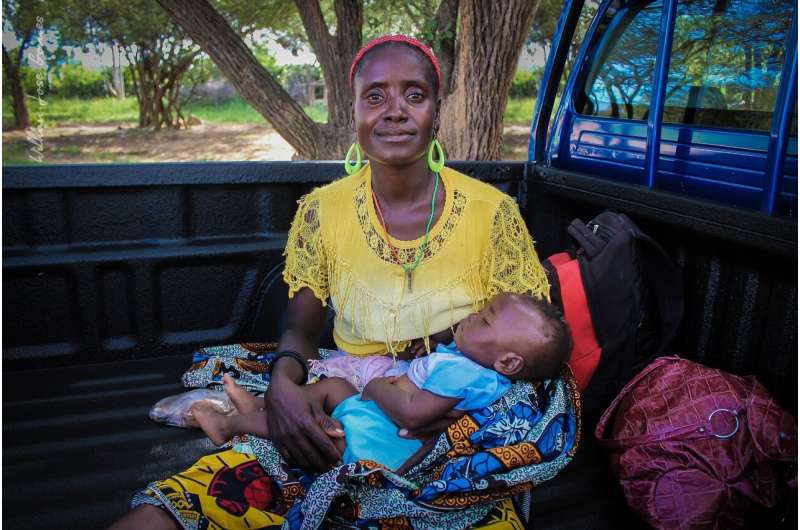Credit: CC0 Public Domain
Pentecostalism is the largest and fastest growing branch of Christianity in the world after the Catholic Church. Thanks to its focus on missionary work, Pentecostalism wields significant power particularly in areas where western secular culture has not gained dominant status, such as in many parts of Africa.
"It's also a major political and social movement. Pentecostal demonology views demons as active agents with the power to influence people and various aspects of their daily lives. Other Christian denominations see this as problematic, as it tends to generate unhealthy phenomena and can result in practices and interpretations that are ethically problematic," explains Sanna Urvas, a doctoral candidate at the Faculty of Theology in University of Helsinki, Finland.
"In many African countries and places such as Papua New Guinea, witchcraft is a part of the traditional culture, but the Christian interpretation sees it as the work of evil spirits. Accusations of witchcraft are typically leveled at women, young people or the poor."
Evil comes from people, not demons
Theologians Amos Yong from the USA and Opoku Onyinah from Ghana are trying to reform Pentecostal thinking and its understanding of sin and evil.
"Yong's approach is exceptional in the Pentecostal context, as he accuses people and communities of evil, instead of demons. This means that evil could be banished by renouncing corruption and unhealthy power structures while protecting the weak, for example."
Onyinah emphasizes the significance of people's personal choices and the responsibilities of the communities instead of blaming misfortune on witchcraft perpetrated by a neighbor," Sanna Urvas describes.
"Both Yong and Onyinah are producing theology that aims at improving the lives of these communities. Both of them protect the underdog by highlighting unfair practices and undoing interpretations that enable abuses of power. Both unequivocally condemn teachings that claim a Christian might be possessed by a demon.
Demonology infringes on human rights
According to Sanna Urvas, belief in demonic possession enables psychological and spiritual violence while polarizing communities.
"Based on studies conducted in Africa, interpreting developmental disabilities as demonic has significantly eroded the human rights of disabled people and reduced their agency. Various illnesses, such as depression, may also be seen as the fault of spirits. This causes significant psychological stress for the disabled or sick person as well as their family."
Claiming that anything out of the ordinary, such as dissident thought, is demonic in nature may also lead to human rights violations.
According to Urvas, various activities across the denominational lines have brought demonological interpretations to nearly all denominations.
"The issue of demonic possession is controversial in the churches and fellowships outside the mainline denominations. Classical Pentecostalism teaches that the sick can be healed through prayer. A constructive interpretation of this would be that the sick person receives support and believes that God can heal them miraculously. Refusal of medical interventions and resorting to exorcisms are more disturbing phenomena. The goal of my research is, among other things, to emphasize an understanding of the underlying causes of illness that combines a medical standpoint with the belief in a healing God. This way, the sick person will receive the best help modern medicine can provide while still benefitting from the psychological and spiritual support of others praying for them. Such an integrated understanding should be embraced throughout the Pentecostal Church and potentially even more broadly."
Women as equal theological authorities
Pentecostalism is a very patriarchal movement, both in Finland and elsewhere. At The Church of Pentecost in Ghana, which is the second case study in Sanna Urvas's research, women are not allowed to study theology or serve as pastors.
"Also in Finland, the Pentecostal Church has very few female theological authorities. It seems I'm the first Pentecostal woman to receive a doctorate in systematic theology at a research university while specializing in Pentecostal theology. Meeting the women in the Ghanaian church was a revelation for them: a woman can also be a doctrinal authority."
Urvas wants to empower all women in the Pentecostal church in Finland and elsewhere:
"We as women have equal rights and opportunities to build healthier beliefs and practices and therefore communities everywhere in the world."
Sanna Urvas, MTh and MA (Dance), will defend her doctoral thesis entitled Theology of sin and evil in Classical Pentecostalism—Two case studies at the University of Helsinki's Faculty of Theology on 16 October 2020 at 2pm. Docent Jaakko Rusama from the University of Helsinki will serve as the opponent and Professor Risto Saarinen as the custos.
Provided by University of Helsinki





















